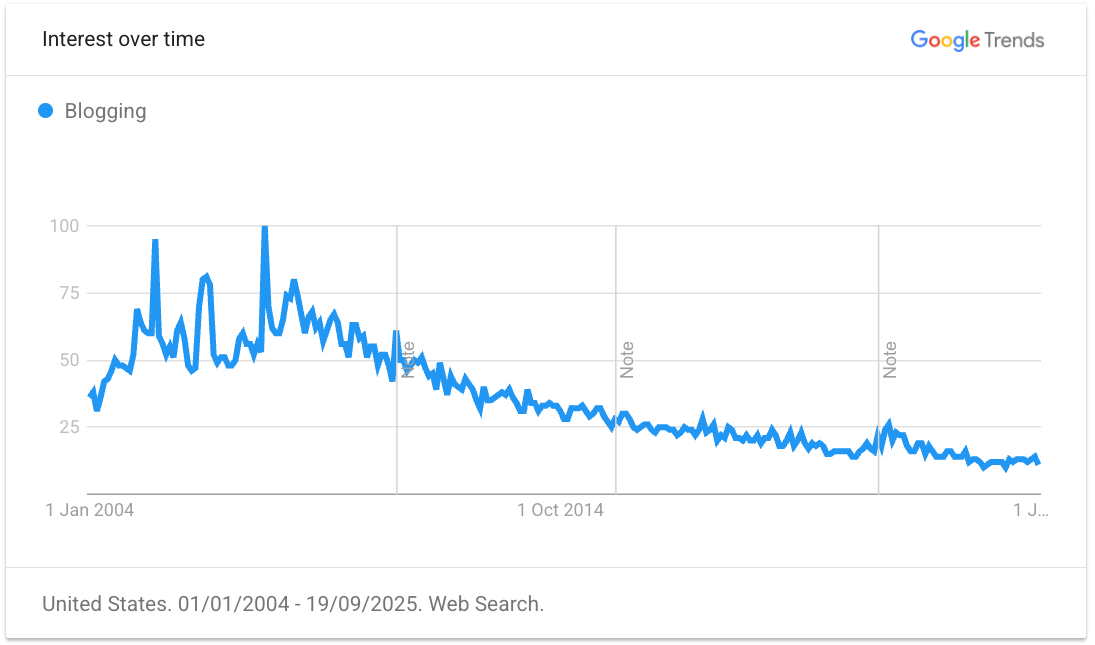Blogging in 2025
How LLMs took away the shiny toys and forced me to actually say something.

For years I had a picture in my mind about my personal blog as a seedling. Every new blog post represented a drop of water which helped the tree to grow. Upon publishing a piece, not much was visible, but I knew that over time the seedling would grow into a tree and would provide shade or just be gentle on the eye.
Writing was something inherently positive and future-oriented. When I finished a piece I always felt that I beat procrastination; I am the one who delayed gratification and won the marshmallow test. The reach of the post didn't even matter. I derived my greatest joy from thinking through a topic and creating something new. Something new that will have a long future.
Now I am struggling to sit down to write. With the arrival of LLMs, writing as a skill became highly exposed to these new technologies. I cannot justify that I am sharpening a skill that will benefit me in the future, regardless of the output. But AI also questioned the value of the output. I played the SEO game with my blogs and often got too excited about the carrot on the stick. I wrote articles which was not my calling to write, just to get some free clicks from Google which then didn't lead anywhere. But meaningful or junk, the potential of these articles to reach a reader equally decreased.
Blogging is not trendy in 2025. My feeling is that long-form is losing its grip for a while, and AI has only partially impacted it. When I started my blog/newsletter in 2019, friends who never read a book asked me about the details of my latest issue, making me happy just by the fact that they read my stuff. A few years later I got more and more responses that they got my letter but it was too long, so they put it away for later. I am sure it didn't happen because my writing became more boring, but rather because the alternatives became more appealing.
I cannot compete with ten-second-long short-form videos. I also understand why a bunch of readers procrastinate reading written content. I started to do the same. And it's not just short-form videos. There are so many great long-form videos, documentaries, and colorful alternatives that, compared to them, a wall of text looks like a chore. I can do videos, but I love writing their scripts better.
If I were to optimize for the "blogging in 2025" keyword (which I partially still do) I would need to answer the big question: what about earning money with a blog in 2025? A question which I am totally unqualified to answer.
When my blog started to take off moderately, I made the calculations of how much extra effort I should put into it to cash out in the form of Google AdSense. It would have needed a ridiculous amount of work to earn more than the price of two scoops of ice cream. I never really signed up for the "package your knowledge" and sell it in the form of a high-ticket course. My type of content is not rocket science, and I always prefer to tackle vitamin rather than painkiller topics. But the ones who followed the course playbook are facing their fair share of challenges. In an era of increasing uncertainty, paying a premium to learn a skill that may get automated in months does not look like a good deal.
Long story short, I was never into blogging because of the money. So let's switch to a question I am suitable to answer: when does it still make sense to write online?
When I am thinking about publishing, I always divide its significance into how writing the piece helps me and how reading it helps the receiver. Often, I got immense clarity just from writing things down, but sharing it wouldn't help anyone. For that case, I keep a journal. When a reader can learn something, get inspired, or get entertained by my article, then I feel it is worth publishing.

The blog landscape of the pre-AI era was far from healthy. I contributed to that by just summarizing all voices about a topic and creating the possibly longest article without added value. Looking back, the articles I am most proud of rereading often didn't even have a keyword in my mind, and most of the time were just opinion pieces instead of guides. When I started to care more about content quality rather than SEO potential, I started to ask the question of what I can add to the topic that others haven't said yet. In the post-LLM era, this question is still relevant.
One can be hyped because of the potential of AI in the blogging sphere. Indeed, AI can help. The main pillars of this post came from one of my voice recordings, which I transcribed with Superwhisper. Claude fixed my typos and strange sentence structures. I also use AI-generated content when its output can be valuable to readers. But I am just smiling at the copy-paste n8n workflows that pump out 2000 articles per minute. It is the skyscraper technique of 2025. It may work, but does it bring joy, let alone results?
A few years ago, I was quite sure that writing online had a future. Now I usually shorten my timeframe when answering any question because I see a real possibility of AI disrupting almost anything. Today, I still think writing well can be a differentiator, not because publishing a blog post can bring great rewards, but because clear writing is clear thinking. To use LLMs well, you need to create rich context, write good prompts, and push these systems to their limit with your follow-up questions. When you just ask an LLM to write an answer, you are eroding your critical thinking skills.
But the internet is still not centered around LLMs, regardless of how much it looks like it based on any industry's news coverage, publishing, and SEO in particular. Good content is still worth writing; what happened is only that AI elevated the bar for entry-level content. I still need to read a Perplexity answer or Deep Research report on any topic where I couldn't find a better articulated and more relatable alternative from someone with actual experience. One could argue that AI is already better at content creation. Maybe it regurgitates facts better, but people read blogs when they have had the same topic already covered in a Wikipedia page. Perspectives, style, and history matter.
But LLMs made one big improvement in how I blog. It took away the shiny toys. The easy traffic sources, the long list of backup topics in the form of popular long-tail keywords, and the satisfying inflated impressions graph in Search Console. It forced me to actually say something instead of just repeating what an author said in a book or how other bloggers covered a topic. It made the game harder. Only topics that require not just research but deep thinking are left in my backlog. Writing a blog became harder but more satisfying for me in 2025.



